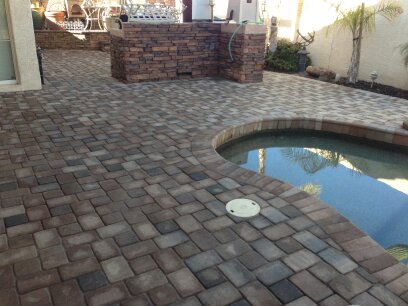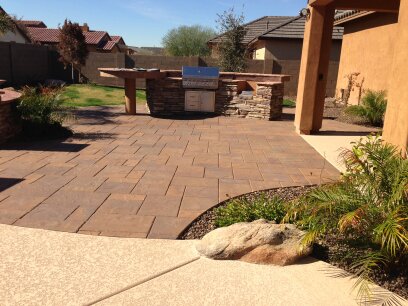Pavers are durable building products that come as brings or stones. They are made from numerous materials, most commonly clay, brick, and concrete. In recent years, pavers have gained largely in popularity, especially for use in driveways and patios as well as garden paths and anywhere on your property where you want a solid and beautiful area upon which to walk, relax, or play. Many people use them for barbeque and cookout areas in their back yards.
A Lifetime of Pavers Enjoyment
Pavers are designed to provide you with years and years of durable enjoyment. If properly cared for, your pavers have a life expectancy of thirty years or more. All that they require is occasional cleaning and a little maintenance. This means sealing your pavers against the elements such as freezing cold winters and rainy springs and summers.
Protecting Your Pavers Investment
Sealing your brick pavers is easy. The sealant need only be applied once every two to three years if done thoroughly and properly. Sealing your pavers provides a barrier that keeps moisture out, preventing tiny cracks from becoming larger, causing damage to the pavers and preventing them from further cracking, or breaking. Sealing also helps to slow down the fading process  caused by prolonged exposure to the sun.
caused by prolonged exposure to the sun.
Certain sealing can slightly alter the color of your pavers. Some people will use sealers to give their pavers a different look, such as a bleached out effect that looks great in certain settings. There are numerous designs in which you can place your pavers, including 9 that are used for patio and driveways that can give your home a completely new appearance. Sealing your pavers help to preserve that great look for many years to come. Here are the basics for sealing your pavers.
Sealing your Pavers
Driveways, patios, and other structures using pavers need to be weather sealed every two to three years. Make sure that you choose a day that is 60 degrees or above with no rain in the forecast to seal your pavers. If sealing driveway pavers, find an alternative area to park for two days and block the end of your driveway to prevent delivery trucks or other visitors from using it.
Choosing the correct sealer for your pavers is a vital step in the sealing process. There is a different sealer for each material from which your pavers are made, be that brick, clay, concrete or other material.
- Measure your square footage application area to determine how much sealer will be needed
- Solvent based sealers last longer and are more effective than water based
- Sealers can be found in most any Home and Garden or Hardware store
You will want to prepare your driveway or patio before applying the sealer to the surface. This can be done by sweeping loose dirt and debris with your patio broom. Once the area has been  thoroughly swept clean, you may power wash the area on a low setting. The actual setting will depend upon the make and model of power washer. Check the owner’s manual before you begin.
thoroughly swept clean, you may power wash the area on a low setting. The actual setting will depend upon the make and model of power washer. Check the owner’s manual before you begin.
NOTE: Avoid harsh chemicals when cleaning stubborn stains, especially fluid leak stains from automobiles as the cleaner is worse for the pavers than the actual stain. Use a mild detergent that is specifically made for cleaning your type of pavers and spill.
Your patio or driveway must be completely dry before sealer can be applied. Read the instructions on the label of the sealer for specific directions on application. Start in one corner (or apex if design is round) and work your way back towards an open area in order to avoid sealing yourself into a corner. Use the recommended sponge roller. Make sure to get a thorough and even coat for best results.
